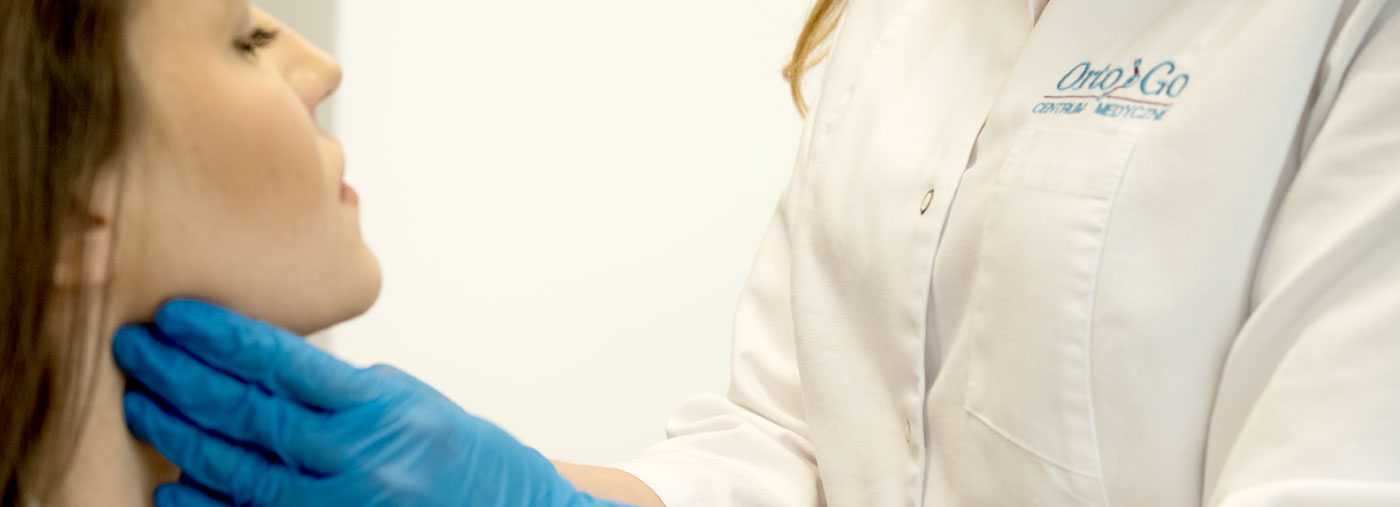Endocrinologist Warsaw and Płock - diagnostics and treatment
See also: Thyroid biopsy, Diabetology, Paediatric endocrinology, Blood collection point - Healthy Thyroid Test Package.
An endocrinologist diagnoses and treats disorders related to the endocrine system and hormonal imbalances. This medical field focuses on disorders affecting the hypothalamus, pituitary gland, thyroid, and other glands. Endocrinology plays a crucial role in maintaining hormonal balance in the body. Therefore, the endocrinologist's role is not only to identify the source of the problem but also to tailor individualized treatment plans. Schedule a consultation with an endocrinologist at OrtoGo Medical Centre in Warsaw or Płock.
What does an endocrinologist do?
Endocrinology, as a specialized branch of medicine, primarily focuses on the endocrine glands and their function in hormone secretion. These glands are crucial for the proper functioning of the body, and any disorder in their operation can lead to serious health consequences. This is why the role of endocrinology is so vital.
As an expert in endocrinology, an endocrinologist specializes in the precise diagnosis and treatment of disorders related to glandular dysfunction. Often, patients may not realize that abnormalities in gland function can cause various symptoms such as fatigue, weight loss, or concentration problems. These disorders can result from both hormone overproduction and deficiency.
Endocrinology emphasizes that the key to effective treatment is accurate diagnosis. After gathering a detailed medical history from the patient, the endocrinologist may perform or request specific tests. Tests such as blood tests or ultrasound scans during the visit provide essential information to the doctor about hormone levels and the condition of the patient's glands. Based on these findings, the specialist in endocrinology can determine the appropriate therapy.
Endocrinology also underscores the importance of preventive care. A visit to the specialist allows for the early detection of potential issues and prevents their escalation. As a result, patients can enjoy better health and quality of life. In conclusion, endocrinology not only treats but also educates patients, highlighting the importance of maintaining hormonal balance in everyday life.
What diseases does an endocrinologist diagnose and treat?
Endocrinology focuses on diagnosing and treating disorders of the endocrine system, which can have a wide-ranging impact on various parts of the human body. Endocrinologists, through their deep knowledge and specialization in the field of endocrinology, are able to diagnose and treat a variety of conditions, such as:
Disorders of the hypothalamus and pituitary gland,
which are important areas in endocrinology and can lead to conditions such as diabetes insipidus.
Thyroid disorders,
including autoimmune Hashimoto's disease and Graves' disease, leading to either hyperthyroidism or hypothyroidism.
Parathyroid disorders,
which can result in various endocrine disorders.
Adrenal disorders,
such as Addison's disease, Cushing's syndrome, hyperaldosteronism, or Conn's syndrome, are another important area in endocrinology.
Pancreatic problems
which can lead to diabetes, insulin resistance, or impaired glucose tolerance.
Ovarian disorders
such as polycystic ovary syndrome (PCOS), which may be associated with fertility issues in women, also find their place in endocrinology.
Testicular diseases
that can affect the production of sex hormones in men, represent another area where endocrinology provides valuable insights.
Endocrinology, considering this diversity of hormonal disorders and diseases, emphasizes the importance of early diagnosis and appropriate treatment. Therefore, it is important for individuals experiencing concerning symptoms not to delay visiting an endocrinologist, who can utilize modern diagnostic methods and treatments to improve patients' quality of life.
When to visit an endocrinologist
Knowledge about symptoms of hormonal diseases and conditions related to hormonal imbalances allows for early detection and treatment of various conditions by an endocrinologist. A visit to an endocrinology specialist is recommended if you experience the following symptoms:
Abnormal test results
If your test results, such as TSH, FT3, FT4, testosterone, progesterone, or prolactin, deviate from the norm, it is a sign that you should consult an endocrinologist.
Thyroid disorders
Endocrinology, as a field of medicine, indicates that symptoms such as chronic fatigue, sudden weight gain or loss may be associated with thyroid disorders. Endocrinology emphasizes the role of parathyroid diseases and conditions such as Hashimoto's or Graves' disease in this context.
Pituitary disorders
If you have been diagnosed with diabetes insipidus or have symptoms indicating pituitary gland hypofunction or hyperfunction, a visit to an endocrinologist is essential.
Other concerning symptoms
Such as persistent acne, menstrual irregularities, galactorrhea, excessive hair growth, or gynecomastia, may be associated with hormonal disorders, which are the primary focus of endocrinology.
Endocrinology stresses the importance of regularly monitoring one's health and not delaying visits to a specialist. If you notice any concerning symptoms, schedule a consultation with an endocrinologist at OrtoGo in Warsaw or Płock. A specialist in endocrinology, with their specialized knowledge and experience, can assist patients in returning to full health.
What does a visit to an endocrinologist look like and how to prepare for it?
Visiting a specialist in endocrinology is a crucial step towards maintaining health and hormonal balance.
Before visiting an endocrinologist, gather all your previous test results. Endocrinology focuses on specific markers such as TSH, FT3, FT4, testosterone, progesterone, and prolactin. If you don't have these results, it's advisable to have them done before your appointment.
During your visit to the endocrinologist, a thorough medical history will be taken to understand your symptoms and medical background.
The endocrinologist will conduct an illustrative ultrasound scan during the visit, especially for issues related to the thyroid. This scan allows the doctor to assess the condition of your glands more accurately.
Depending on your symptoms and test results, the endocrinologist may order additional tests such as scans, biopsies, or specialized laboratory tests.
Based on the gathered information, the endocrinologist will develop an individualized treatment plan. This may include dietary changes, lifestyle adjustments, medications, or other interventions. Endocrinology emphasizes the importance of an individualized approach to each patient, so it's important to follow the recommendations and consult regularly with your doctor.
Remember, it's beneficial to come to your appointment well-prepared to fully benefit from the specialist's expertise.
We encourage you to take advantage of a consultation with an endocrinology specialist at OrtoGo Medical Centre in Płock or Warsaw. Our clinics are at your service to provide the highest quality medical care.
Endocrinologist Warsaw and Płock
In our medical facilities, we offer:
- endocrinology consultation
- thyroid ultrasound examination (conducted during the visit)
- issuance of necessary documents for the Social Insurance Institution (ZUS), Agricultural Social Insurance Fund (KRUS), Insurance Companies, Disability Assessment Commissions
In our medical centres, you can also have the laboratory tests ordered by the endocrinologist from urine and blood samples (including measurements of TSH, FT3, FT4, testosterone, progesterone, prolactin, calcium, phosphorus, and blood glucose levels).
Have you got questions? Get in touch with us - 22 100 45 20 or 24 337 62 66.
You can check the cost of consultation in the field of endocrinology and other services in our price list.




